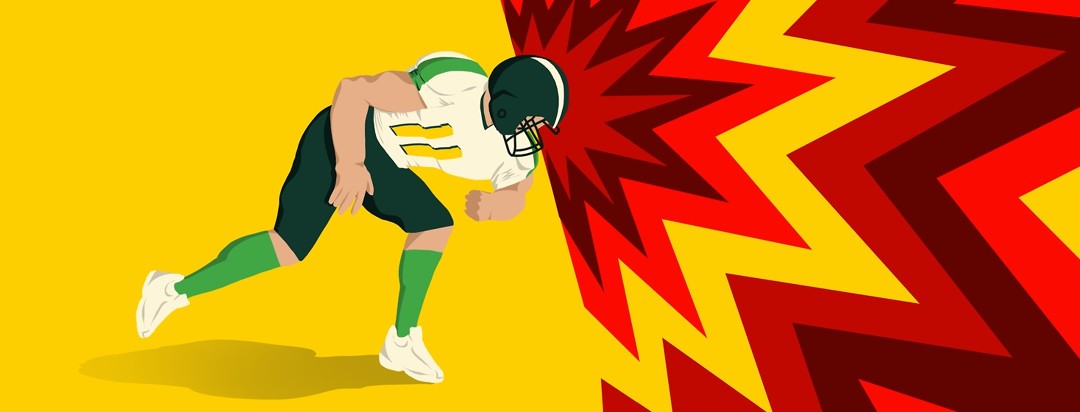The Connection Between Head Injury, Brain Injury, and Alzheimer's
Everyone touched by Alzheimer's, whether it's directly or by virtue of having a loved one with it, knows that Alzheimer's is a disease of the brain. The brain deteriorates.
As we also know, this deterioration can be amplified by other causes: poor cardiovascular health, smoking, high cholesterol, other disease entities like diabetes, congenital defects, lifestyle factors, aging, and more direct causes like brain injury to name a few.1
I'm in no way suggesting that because of these, we will be touched by Alzheimer's, but I am saying it could increase our risk. Many of those I have just named are risks we can modify to prevent.
My dad's head injury
Today, language and meaning have changed: head injury is commonly referred to as brain injury. It is difficult for people to separate the 2.2
I want to touch on this subject because it is the one that intrigues me; I know it is what advanced my dad's journey through Alzheimer's faster than it would have normally gone.
We don't know what caused my dad to pass out in the shopping plaza's parking lot that terrible day. I don't know that we were ever told for sure, but as I know a lot about my dad's health history, I suspect it was a combination of medication mismanagement and plummeting blood pressure. The medication mismanagement was not the result of Dad's doctor's mishandling.
It was, however, in the days before electronic medical records when one specialist did not talk or write to another directly. This is likely because, well, the person with Alzheimer's appeared to be good at communication, could pass on the information, and the doctors were in different cities. By all appearances, he had it together and could tell each doctor what the other said.
Medication mismanagement
Dad didn't - he was taking a combination of medications that were negatively interacting with one another. This was likely most of the reason his blood pressure dropped so dramatically that he passed out after getting out of the car.
He hit his head on the pavement hard. Adding to this was the fact that he was on a blood thinner. Dad was in pretty bad shape. He was rushed to the hospital and had brain surgery to relieve a subdural hematoma. This head injury profoundly affected his journey through Alzheimer's.
I should say it was not just the head injury that forced Alzheimer's to advance, and he had several other risk factors all came together that I'll talk about another time.
Brain injury as a risk factor for developing Alzheimer's
Looking more broadly at head injuries, as I said, we now know a head injury is commonly referred to as a brain injury. Some brain injuries are mild, and some are more severe, but the cumulative effect of several minor brain injuries can lay the foundation for Alzheimer's later in life.
Think for a moment about sports. Sports teach us teamwork, keep our bodies healthy, and so on. But there is a downside to sports with the high potential for concussion.3
Back when Dad was in high school, football did not require a helmet. Concussions were common, but it was a 'tough it out and get back to playing the game' environment. Today in high school, college, and professional football, helmets are mandatory.
But head injuries still occur, whether by the nature of the game or fighting. I watched the news the other day regarding a fight in a professional football game: the aggressive player pulled the helmet off a player and hit another player in the head with it. We see this in hockey as well.4
Spotting risks for head injuries
Back in the day, fighting was encouraged. It was expected and part of the game - not just in the National Hockey League but in kid's hockey as well.
When my son played hockey growing up, concussions were an issue from fighting and how they were hit and checked on the ice. He was concussed once during his more than 12 years playing hockey, but let me tell you, I was worried sick every time a hit sent him headfirst into the boards.
Now consider concussions elsewhere, such as the extreme sports of today like boxing or mixed martial arts fighting. A kick or punch to the head is a concussion, for sure. There are also high-risk jobs where concussions would not be uncommon - the military and construction jobs.
Last but not least, people like myself are just plain clumsy. We never learned to watch what we are doing or duck when we are supposed to.
Dad's history of brain injuries
When I look at my dad's history, I know that brain injuries played a significant part in his journey. When I consider the number of times I hit my head, I wonder if the cumulative effect will lead me down a similar path. Unfortunately for me, you can't always fix clumsy, but I can try to be more aware.
Regardless of what has caused a brain injury, we know there is a strong potential link to many types of dementia, including Alzheimer's, later in life. Should we no longer have sports that could lead to dementia down the line? Of course not, but we do need to continue on the path to safer sports. We need to ensure jobs are safer for the worker and that our military has what they need to do their job as safely as possible in a high-risk environment.
We will never be able to prevent all brain injuries from occurring, but as we watch the incidence of Alzheimer's rise, we need to do more to modify the risk of head injuries.
Community Poll
Have you had difficulty keeping your loved one hydrated?

Join the conversation